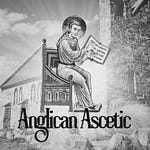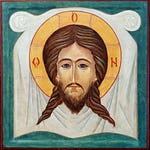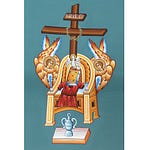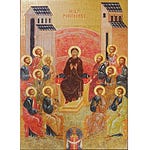Anglican Ascetic Podcast focuses on prayer life in the Anglican tradition—a tradition rooted in the New Testament Church, which became manifest when the womb of the Upper Room went Boom, into its sub-apostolic and patristic eras, and those following, to the present moment.
The material used in this episode is found below:
1. A prayer of Blessed Jeremy Taylor, Bishop and Confessor (d. 1667):
O Holy and ever blessed Spirit, Who didst overshadow the Holy Virgin-Mother of our Lord, and caused her to conceive by the miraculous and mysterious manner; be pleased to overshadow our souls, and enlighten our spirit, that we may conceive the holy Jesus in our heart, and may bear Him in our mind, and may grow up to the fullness of the stature of Christ, to be perfect in Christ Jesus. Amen.
2. S. Mark 1:4-8
John did baptize in the wilderness, and preach the baptism of repentance for the remission of sins. And there went out unto him all the land of Judæa, and they of Jerusalem, and were all baptized of him in the river of Jordan, confessing their sins. And John was clothed with camel’s hair, and with a girdle of a skin about his loins; and he did eat locusts and wild honey; and preached, saying, There cometh one mightier than I after me, the latchet of whose shoes I am not worthy to stoop down and unloose. I indeed have baptized you with water: but he shall baptize you with the Holy Ghost.
3. The Venerable S. Bede, a portion of Homily 1.1 on S. Mark 1:4-8
It was in the desert that Saint John gave his own baptism and proclaimed the baptism of Christ. Moreover, John lived his whole life in desert places from the time that he was a boy. This was so that as a first-rate teacher he might add the force of his example to what he was proclaiming in words; and as one who was persuading his hearers to forsake their sins in repentance, he might himself turn away from the vices of sinners, not only by mental punishment, but even by his physical location.
Typologically, however, the desert where John remained separated from the allurements of the world designates the lives of the Saints, who, whether they live as solitaries or mingled with the crowds, always reject the desires of the present world with the whole intention of their minds. They take delight in clinging only to God in the secrecy of their heart, and in placing their hope in Him. This solitude of mind, most dear to God, is what the Prophet desired to attain with the help of the grace of the Holy Spirit when he said, “O that I had wings like a dove! for then would I flee away, and be at rest.” And as soon as he had secured this solitude by the Lord’s help, he gave thanks, and as though reviling the entanglements of ordinary earthly desires, he continued, “Lo, then would I get me away far off, and remain in the wilderness.” (Psalm 55:6-7)
And, when the people had been liberated from Egypt by the blood of the lamb and had been led through the Red Sea, the Lord first instructed them for forty years in the desert, and so led them into the land of promise. Surely the faithful cannot pass immediately after baptism to the joys of the heavenly fatherland, but first they must be trained by long struggles in the exercise of virtues, and then they will be granted the abiding gift of heavenly blessedness.
4. Martin Thornton’s chapter “Silence”, from Prayer: A New Encounter—link to whole chapter
5. Thornton quote 1: “Withdrawal into silence is no escape but a concentrated confrontation with reality.”
6. Thornton quote 2: “Silence is the environment of creativity, the essential condition for letting-be, the birthplace of love.”
7. Summery of Thornton on the three biblical meanings of “eremos”—desert, lonely place, devastated country, wilderness
the scene of danger and desolation
haunt of the Gadarene Demoniac in Luke 8.29
place of physical peril for S Paul (2 Cor 11.26)
place of devastation: "And Jesus knew their thoughts and said unto them, every kingdom divided against itself is brought to desolation" (Mt 12.25)
Again, Jesus: "Behold your house is left unto you desolate" (Mt 23.38)
When the unclean spirit is gone out of man, he walketh through dry places seeking rest" (Mt 12.43)
the refuge of the persecuted
where Elijah flees from Jezebel into the wilderness, there to find rest and spiritual refreshment, symbolized by cake and water (1 Kings 19)
Mark 1.35: "In the morning, rising up a great while before day, Jesus went out and departed into a solitary place, and there prayed."
Mark 6.31: “Jesus said unto them, come ye yourselves apart into a desert place, and rest a while."
a source of fruitfulness, creativity, and victory
the stories of Moses and Elijah issue in prophetic insight, divine disclosure
the desert retreat of Jesus shows victory over the Devil
Isaiah's great hymn to silence: Isaiah 35:1-2
"The wilderness and the solitary place shall be glad for them; and the desert shall rejoice even with joy and singing: the glory of Lebanon shall be given unto it, the excellency of Carmel and Sharon, they shall see the glory of the Lord, and the excellency of our God"










Share this post